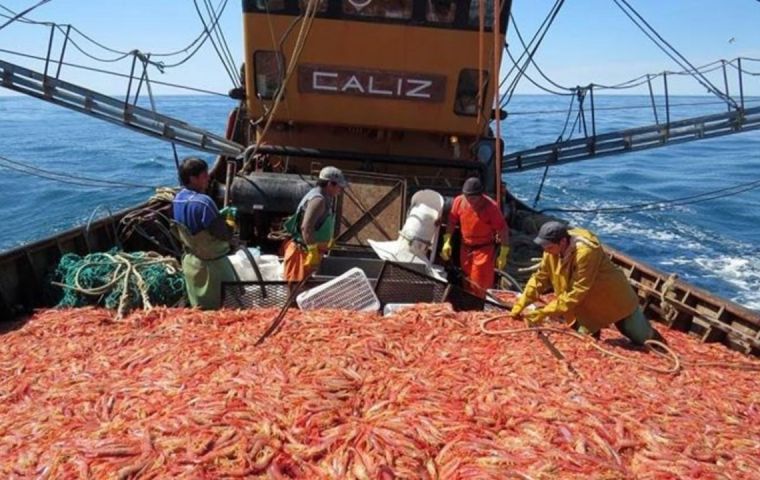MercoPress. South Atlantic News Agency
Chubut imposes strict measures on shrimp landings to protect the fishery
 Fisheries secretary Gabriel Aguilar reached an agreement with the provincial fish industry chambers
Fisheries secretary Gabriel Aguilar reached an agreement with the provincial fish industry chambers The Argentine Patagonia province of Chubut has imposed strict limits to the landings of shrimp caught in its waters, with the purpose of protecting the resource, limiting discards and damaged crustaceans which result in lower prices because of poor quality.
Fisheries secretary Gabriel Aguilar reached an agreement with the provincial fish industry chambers and the measures will be implemented in all Chubut ports limiting volume landings for artisanal, coastal and high seas vessels, plus the recommendation that the same caution be applied to “national waters”, where the province does not have jurisdiction.
Volume landing limits are calculated according to the vessels' size, potential and will only be allowed a daily outing.
The agreement represents “an advance in sorting the Patagonian shrimp fishery, working in consensus with the fishing sector, and above all with the purpose of preserving the resource, which although limits catches it ensures the fishery's long term” said Fisheries secretary Aguilar adding that the measures will improve productivity, reliability and help with anticipation of future activities, plus the sustainability of jobs.
Aguilar also underlines that Chubut represents 85% of shrimp landings in Argentina which gives an idea of how privileged the province is, and “it is our job to guarantee that catches are sustainable”.
However the truth seems to be closer to the fact that there is/was a bumper harvest of shrimp, and vessels were over catching which among other things means bad fishing practices and damaged crustacean tails.
Queues for landings as ports are congested can lead to melanosis or black spots and the smell of the shrimp blocks. Besides many shrimp tails are damaged which has an impact on discarding and prices at the processing plants.
Good quality tails make up to US$ 6,50 a kilo, but the poor quality ones barely reach US$ 4,50. It was precisely the fact that a high percentage of catches was of poor quality forcing significant percentages of discards that led to a round of meetings with officials to address the issue.
“At first we thought they were isolated cases but unfortunately we confirmed it was a major problem. Quality plus the increase of the fishing efforts combined for a bumper crop to turn into a ”disastrous season”, according to the chamber of processing plants.
In effect the high seas vessels were allowed to remain 72 hours in the fishery, to which then had to be added sailing time back for landing, and probably a congested port with a further delay.




Top Comments
Disclaimer & comment rulesCommenting for this story is now closed.
If you have a Facebook account, become a fan and comment on our Facebook Page!